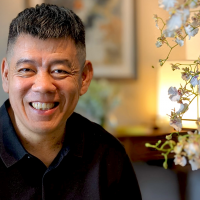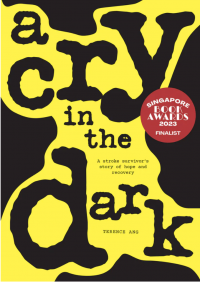Terence Ang Interview Published on: 20, Nov 2024
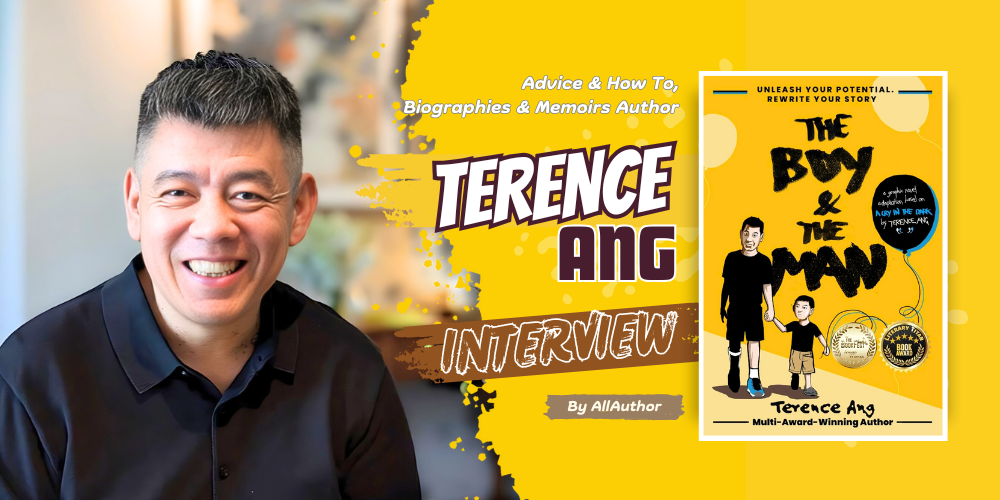 Can you share what inspired you to write A Cry in the Dark and how your personal experience influenced the book?
Can you share what inspired you to write A Cry in the Dark and how your personal experience influenced the book?
I never imagined I’d write a book, but the stroke was a wake-up call that changed everything overnight. Suddenly, I found myself outside my comfort zone—going from a man in control to someone dependent on others. Losing my job, something I was deeply passionate about, was devastating. I turned to writing as a way to process my experience and as therapy, but also as a way to reach others. A Cry in the Dark became an outlet for sharing my journey and showing others that, even in our darkest moments, there's hope.
How did the stroke impact your life both personally and professionally, and what were some of the biggest challenges you faced during that time?The stroke showed me who my true friends were. Some who claimed to care disappeared when I needed them most, while others stood by me unconditionally. This experience highlighted the importance of family and loved ones who supported me when I was most vulnerable. The biggest challenges included losing my mobility, dealing with aphasia that affected my memory and speech, and facing the reality that I could no longer continue in the job I loved.
What was your writing process like for A Cry in the Dark? Did you face any particular obstacles or breakthroughs while writing it?Writing A Cry in the Dark was a therapeutic journey for me. I could release my frustrations by openly telling my story. I initially planned to hire a professional artist for the illustrations, but my doctor encouraged me to create the drawings myself, saying they would feel more authentic. Taking his advice, I had to use my weak hand, which was a huge obstacle, but ultimately, it was a breakthrough in reclaiming my creativity and confidence.
A Cry in the Dark was well-received and led to a speaking engagement at the World Stroke Congress 2022. How did that experience impact you and your work?The book gained publicity and caught the attention of Singapore National Stroke Association. She encouraged me to speak at the World Stroke Congress in 2022. Initially, I was reluctant because of my self-consciousness, but with the support of friends like A/Prof Shamala Thilarajah (President, Singapore National Stroke Association) , I gained the courage to do it. The experience was empowering—it boosted my confidence and connected me with new friends and collaborators who expanded my network and influence.
In Emerging from the Dark, you incorporate the stories of other stroke survivors along with your illustrations. What motivated you to include these personal stories, and how did you choose whom to feature?With Emerging from the Dark, I became more aware that many others faced similar struggles. I wanted to share not only my story but also those of other survivors to show that stroke can happen to anyone, regardless of age, and that recovery is a shared journey. I featured individuals who responded quickly, as I was working within a tight deadline. This book received global attention, and I hope to continue sharing more stories in the future.
How do you think Emerging from the Dark shifts perspectives on stroke recovery compared to other works on the subject?Emerging from the Dark is unique because it blends survivor experiences, personal reflections, and illustrated quotes. It’s not just a personal or clinical account—it’s a resource that can be read in any order, offering comfort and inspiration for readers whenever they need it. The quotes resonate with readers on different levels, providing strength and encouragement as they face their own challenges.
Your books have received numerous awards and recognitions. How do you feel about these achievements, and what do they mean to you personally and professionally?The awards validate the hard work and dedication I put into my books. Knowing that my efforts resonate with others is incredibly fulfilling. These achievements motivate me to continue creating meaningful work and raise the bar for my future projects.
Can you discuss some of the most memorable feedback or reactions you’ve received from readers of your books?Some of the most memorable feedback I’ve received has come from people who’ve said my books helped them feel less alone. Stroke can be a very isolating experience, and hearing from readers who found strength and comfort in my story is incredibly fulfilling. There was one reader, for example, who reached out to tell me how A Cry in the Dark helped her family understand what her father was going through after his own stroke. She said it was like reading his thoughts—things he couldn't put into words himself. I’ve also had readers thank me for sharing the emotional side of recovery, which is often overlooked. Knowing that my journey resonates and supports others going through similar challenges makes everything I’ve endured feel worthwhile
What role do you think storytelling plays in the recovery process for stroke survivors, and how does it contribute to their healing journey?Storytelling provides comfort to stroke survivors by letting them know they’re not alone. When I first experienced my stroke, I was in denial, shutting out the world. It took a month to accept what had happened. Books like A Cry in the Dark and Emerging from the Dark would have been invaluable to me at that time. Reading others’ stories helps survivors feel understood and inspired, making storytelling a powerful tool for healing.
Your illustrations are a significant part of Emerging from the Dark. How do you approach the process of creating these illustrations, and what do they add to the narrative?I’ve always been drawn to visual storytelling, even in my career in marketing. For Emerging from the Dark, I wanted the illustrations to be raw and authentic, reflecting my personal journey. The drawings aren’t perfect, but that’s the point—they symbolize my resilience and what I’ve been able to accomplish despite the stroke. They offer hope to readers, showing that recovery is possible and that one can still create beauty from adversity.
How has your background in digital marketing and e-commerce influenced your approach to writing and promoting your books?My background in digital marketing has been invaluable. It taught me the importance of connecting with an audience on an emotional level, which translates well into writing personal stories. Marketing isn’t just about selling a product; it’s about understanding people’s needs and finding ways to resonate with them. For my books, I applied this by focusing on authentic storytelling and creating a strong online presence to reach a wider audience. I knew that a book like A Cry in the Dark could make an impact if it reached the right readers, so I used social media and digital tools to promote it effectively. My experience in e-commerce also gave me a good understanding of online distribution channels, which has helped me get my work into more hands worldwide.
What are some common misconceptions about stroke recovery that you hope to address through your writing?One big misconception is that recovery follows a clear, linear path and that once you reach a certain point, you’re “healed.” Recovery, especially from something as complex as a stroke, is rarely that straightforward. There are days when it feels like I’ve made a lot of progress, and then there are days where the challenges feel just as hard as they did in the beginning. I also want to challenge the idea that recovery is purely physical. The emotional and psychological aspects are just as important. Through my writing, I aim to show that recovery is about resilience, adaptability, and learning to embrace a new reality, which might look different from the one you had before. There’s also this assumption that stroke only affects older people, but as I share in Emerging from the Dark, stroke can affect anyone, at any age. By highlighting stories from younger survivors, I hope to raise awareness and inspire more understanding and support.
The Boy and The Man (my latest project) has achieved significant recognition, including winning The BookFest® Fall 2024 Awards and being featured in the NYC Times Square billboard for World Stroke Day. What does it mean to have released this as your final book before moving on to new creative pursuits, and what’s next on your journey?The Boy and The Man has been an incredibly meaningful project for me, and its success has been both humbling and validating. Winning The BookFest® Fall 2024 Awards and seeing it displayed in Times Square for World Stroke Day felt like the culmination of years of hard work and resilience. This graphic novel marks a chapter I can proudly close, a milestone that symbolizes my growth since my stroke. Now, as I approach retirement, I’m thrilled to pursue a long-held dream: filmmaking. I look forward to exploring storytelling through film, sharing messages of resilience and hope in a new way. My partner and I are also excited to travel the world, creating fresh memories as we embrace this new phase of life together.
I’m working on a graphic novel based on A Cry in the Dark. While the storyline is similar, this new project goes beyond survival. It’s a raw testament to hope and the human spirit. It’s a message for those who feel lost or on the brink of giving up—you’re stronger than you know. Even in the darkest moments, there’s a path forward.
What advice would you give to someone who is just beginning their own journey of recovery from a stroke or other major life challenge?You must decide how you want to move forward. While others can support you, the strength to continue lies within you. It’s up to you to keep fighting or to give up, but know that you’re not alone. Don’t isolate yourself—seek help, connect with your community, and find strength in those around you. And when you’re ready, you can pay it forward by supporting others on their own journeys.
What do you think of AllAuthor, and would you recommend it to your other author friends?I’ve found AllAuthor to be an incredibly valuable platform for authors. It provides excellent tools for promoting books and connecting with a wider audience. The regular features, promotional options, and social media support have helped increase visibility for my books in ways that would be challenging to achieve on my own. The AllAuthor team is also very supportive, making the process smooth and engaging. I would definitely recommend it to other authors, especially those looking to expand their reach and build a stronger presence in the book community.
Terence Ang is a Singaporean author and stroke survivor whose journey from personal crisis to resilience has inspired many. His first book, A Cry in the Dark, poignantly captures his struggle and resilience through this life-changing event, earning recognition at the 2023 Singapore Book Awards. As he continues to work on his third book, Ang’s story remains a testament to the indomitable spirit of recovery and the transformative power of adversity.
 The Boy And The Man : Unleash Your Potential. Rewrite Your Story
Genre: Advice & How To, Biographies & Memoirs, General Nonfiction
The Boy And The Man : Unleash Your Potential. Rewrite Your Story
Genre: Advice & How To, Biographies & Memoirs, General Nonfiction
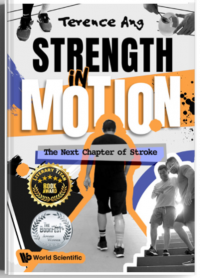 STRENGTH IN MOTION : The Next Chapter of Stroke
Genre: Advice & How To, Biographies & Memoirs, General Nonfiction
STRENGTH IN MOTION : The Next Chapter of Stroke
Genre: Advice & How To, Biographies & Memoirs, General Nonfiction
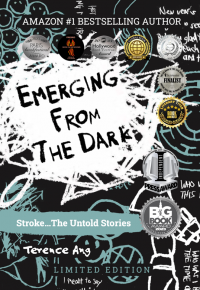 Emerging From the Dark: Stroke...The Untold Stories
Genre: Advice & How To, Biographies & Memoirs, General Nonfiction
Emerging From the Dark: Stroke...The Untold Stories
Genre: Advice & How To, Biographies & Memoirs, General Nonfiction
 Emerging From the Dark: Wish I Knew About This
Genre: Advice & How To, Biographies & Memoirs, General Nonfiction
Emerging From the Dark: Wish I Knew About This
Genre: Advice & How To, Biographies & Memoirs, General Nonfiction
